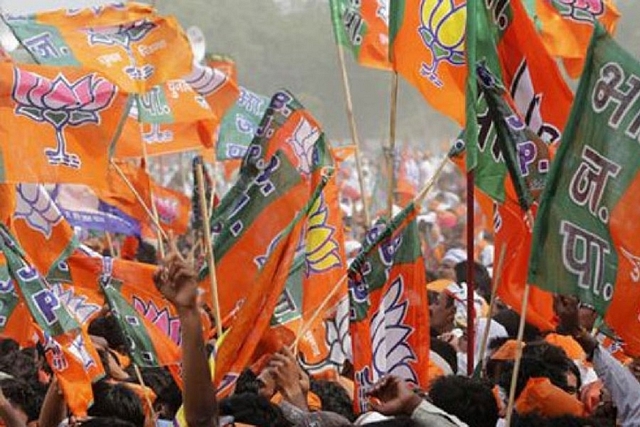
BJP Most Important Foreign Political Party In The World From Standpoint Of American National Interests: WSJ
New York, Mar 21 (PTI) An opinion piece in the influential Wall Street Journal has described the BJP as the most important foreign political party in the world for America's national interests and the 'linchpin' of the US strategy in the Indo-Pacific amidst China's increasing assertiveness in the region.
The BJP may also be the least understood, the opinion piece written by Walter Russell Mead, a leading American academic, commented. He added that the party combines the most striking principles of three major political entities in the world - the Likud Party of Israel, the Communist Party of China and the Muslim Brotherhood of Egypt.
According to the opinion piece published on Monday, the BJP is poorly understood in the West because it grows out of a political and cultural history unfamiliar to most non-Indians.
The BJP's electoral dominance reflects the success of a 'once obscure and marginal social movement of national renewal based on efforts by generations of social thinkers and activists to chart a distinctively Hindu path to modernisation', it says.
'Like the Muslim Brotherhood, the BJP rejects many ideas and priorities of Western liberalism even as it embraces key features of modernity. Like the Chinese Communist Party, the BJP hopes to lead a nation with more than a billion people to become a global superpower,' Mead writes.
'Like the Likud Party in Israel, the BJP combines a basically pro-market economic stance with populist rhetoric and traditionalist values, even as it channels the anger of those who’ve felt excluded and despised by a cosmopolitan, Western-focused cultural and political elite,' the 70-year-old academic says.
'After an intensive series of meetings with senior BJP and RSS leaders, as well as some of their critics, I am convinced that Americans and Westerners generally need to engage much more deeply with a complex and powerful movement,' Mead says.
From a fringe of mostly marginalised intellectuals and religious enthusiasts, the RSS has become perhaps the most powerful civil-society organisation in the world, he writes.
Mead also highlights the importance of stronger ties between the US and India.
'It's important because the BJP - which came to power in 2014, won a second term in 2019, and is headed for a repeat victory in 2024 - sits securely at the helm of Indian politics at a time when India is emerging both as a leading economic power and, along with Japan, as the linchpin of American strategy in the Indo-Pacific,' he writes.
'For the foreseeable future, the BJP will be calling the shots in a country without whose help American efforts to balance rising Chinese power are likely to fall short,' Mead writes.
The invitation to engage with the BJP and RSS is one that Americans can’t afford to reject, Mead says.
'As tensions with China rise, the US needs India as both an economic and political partner. Understanding the ideology and the trajectory of the Hindu nationalist movement is as important for business leaders and investors seeking to engage economically with India as it is for diplomats and policymakers wanting to put the strategic relationship on a stable footing,' he writes.
The US, India and several other world powers have been talking about the need to ensure a free, open and thriving Indo-Pacific in the backdrop of China's rising military manoeuvring in the resource-rich region.
Mead also writes about his meeting with Yogi Adityanath - the chief minister of India's most populous state Uttar Pradesh - and recalls that the conversation was about bringing investment and development to his state.
'Similarly, Mohan Bhagwat, the leader of the RSS, spoke to me about the need to accelerate India's economic growth, and disavowed the idea that religious minorities should suffer discrimination or loss of civil rights,' he writes.
How these statements by top leaders to a foreign journalist will percolate down to the grassroots is impossible to predict, he says.
'But I did get the impression that the leadership of a once-marginalised movement wants to position itself as the natural establishment of a rising power and is looking to engage deeply and fruitfully with the outside world without losing touch with its social and political base,' he adds.
(This story has been published from a wire agency feed without any modifications to the text. Only the headline has been changed.)